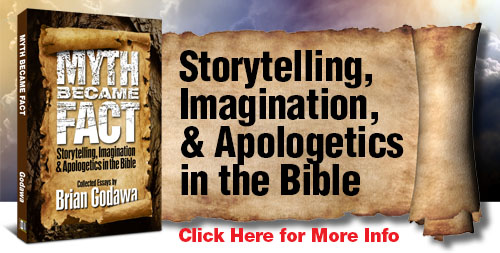Whenever I consider that I have something important to say about faith, imagination, and/or apologetics, I usually discover that C.S. Lewis has already said it long before I could, and he has said it better than I will. True to form, the title of my book Myth Became Fact, is actually the title of a famous essay by the late Lewis that describes the heart of Christianity as a myth that is also a fact. He comforts the fearful modernist Christian whose faith in the Bible as a book of doctrine and abstract propositions is suddenly upset by the frightful reality of the interaction of holy writ with legend, pagan parallels, and mythology.
Rather than deny the ancient mythopoeic nature of God’s Word as modern Evangelicals tend to do, Lewis embraced it as a reflection of God’s preferred choice of concrete communication over abstraction (the worshipped discourse of the modernist). He understood myth to be the truth embedded into the creation by the Creator in such a way that even pagans would reflect some elements of that truth. Thus, when God Himself incarnates truth into history in the life, death, and resurrection of Jesus Christ, it is no surprise that it takes on mythopoeic dimensions reflected in previous pagan notions of dying and rising gods.
He concludes his essay with these memorable words:
We must not be ashamed of the mythical radiance resting on our theology. We must not be nervous about “parallels” and “pagan Christs” — they ought to be there — it would be a stumbling block if they weren’t. We must not, in false spirituality, withhold our imaginative welcome. If God chooses to be mythopoeic — and is not the sky itself a myth — shall we refuse to be mythopathic? For this is the marriage of heaven and earth: perfect myth and perfect fact: claiming not only our love and our obedience, but also our wonder and delight, addressed to the savage, the child, and the poet in each one of us no less than to the moralist, the scholar, and the philosopher.[1]
Now, any Christian post that uses the word “myth” in its title and attempts to address this concept in a Biblical context had better define some terms, because a common reaction of many Christians is often one of mistrust. In their minds, “myth” means “false,” and since the Word of God can never be false, the category of myth is anathema in relation to the Bible.
But this is not an accurate assessment of the varied understandings of myth. Because of a modernist bias of anti-supernaturalism, some scholars define myth as “a necessary and universal form of expression within the early stage of man’s intellectual development, in which unexplainable events were attributed to the direct intervention of the gods.”[2] In some critical and liberal quarters of theology, this connotation has stuck to the meaning of myth and certainly warrants critique in light of its prejudicial definition that assumes a materialist universe without supernatural agents.
But a more specific and recent definition of myth is appropriate to our discussion. In this sense, myths are, as Northrop Frye has explained, “stories that tell a society what is important for it to know, whether about its gods, its history, its laws, or its structures.”[3] In this sense, mythical stories, whether historically factual or fictional, do the same thing; they reveal true transcendent meaning. By this definition, calling the Bible mythical in some of its characteristics or imagery is not to jeopardize its historical claims. In fact, the Bible often claims to reveal the unseen transcendent meaning and purposes behind imminent historical events. Thus, Lewis’ phrase, “myth became fact.”
The problem comes when Christians seek to protect the Bible’s reliability by demanding it be “historical” or “factually accurate” according to modern definitions of history writing and factual reporting or observation. They conclude that if the Bible is not accurate according to the “plain reading” of the text, then it cannot be relied upon to be truthful about the more important issues of God and salvation.
Let the reader be careful to note that I did not deny the historicity of the Bible, but I did make a distinction between our modern notion of what constitutes historical writing (historiography) and the ancient’s notion of what constituted historical writing. For us to demand that the Biblical text be scientifically or historically “accurate” as we define those terms is not a high view of Scripture, it is a low view of Scripture. It is in fact imposing our own prejudices upon the text by refusing to understand it within its context. This is called cultural imperialism and it is the height of hubris, or human pride.
One example of this kind of modern hubris in defining history can be found in the notion of genealogies. In the Bible, genealogies are often used as apologetic tools to prove chosen lineage. The modern notion of historical precision and chronological accuracy is not always a part of the Biblical understanding of genealogy that prioritizes theological truth over historical veracity. The genealogical formula of Genesis, “X is the son of Y” that once was interpreted as the “plain reading” of literal sons is now universally acknowledged to involve historical gaps which renders the term “son of” as often figurative and not literal. “X is the son of Y” often means, “X is a descendent of Y.” This is not liberal denigration of the Bible, it is the Bible’s own context of meaning when it comes to genealogies.
The most important genealogy to Christians is of course that of Jesus Christ, the Son of God and “Son of David.” In Matthew chapter 1, Matthew details Christ’s genealogy and concludes, “So all the generations from Abraham to David were fourteen generations, and from David to the deportation to Babylon fourteen generations, and from the deportation to Babylon to the Christ fourteen generations” (1:17). So Matthew uses Christ’s genealogy as an apologetic by exegeting the symbolic number of 14 as being historically symmetrical in the lineage. There’s only one problem: It’s not “historically accurate” — at least by our definition of history. And it is the Bible itself that proves this, not liberal theology.
As Bible commentator Craig Blomberg explains,
The actual number of generations in the three parts to the genealogy are thirteen, fourteen, and thirteen, respectively… When one compares the genealogy with Luke’s account (Luke 3:23–37) and with various Old Testament narratives, it is clear that Matthew has omitted several names to achieve this literary symmetry.[4]
As Blomberg hints at, Luke’s generations that match up with those Matthean segments are even more off the 14/14/14 mark. His are 14/21/21!
Hyper-literalists beware: the Bible itself shows us that Biblical genealogies are not always historically accurate by our modern definitions of history (which actually operate upon false naturalistic presuppositions and false notions of objectivity). They are first and foremost theological in their interpretation and only secondarily are they historical. I call this the difference between literal and literary. Genealogies are often more literary than literal.
So to suggest that the way the Bible treats history sometimes includes figurative or mythopoeic dimensions that are not “historically accurate” or precise by our reckoning is not liberal subterfuge but Biblical fidelity. I will show later that their historical writing also involved subversion of pagan imagination. It is an unbiblical and humanistic belief to assume that the understanding of the Bible’s approach to historical writing matches our understanding of naturalistic historical writing. I show in Myth Became Fact that there are quite a few more elements of mythopoeic writing that God uses that may make the modern Christian uncomfortable, but are clearly Biblical.
I will explore some of those examples of redeemed pagan imagination in future posts.
[1] C.S. Lewis, God in the Dock, (Fount Publishing, 1998, 1970), 67.
[2] Brevard S. Childs, A Study of Myth in Genesis 1-11, (Dissertation, zur Erlangung der Doktorwurde der Theologischen Fakultat der Universitat Basel, 1955), 1-2.
[3] Robert A. Armour, Gods and Myths of Ancient Egypt (Cairo, Egypt and New York, NY: The American University in Cairo Press, 2001), 2.
[4] Craig Blomberg, vol. 22, Matthew, The New American Commentary, 53 (Nashville: Broadman & Holman Publishers, 1992).



2 comments on “Of Myth and the Bible – Part 1: The Lie of Modern History”
I agree that the way the Bible’s ancient historical narratives are accurate differs from modern standards of historical accuracy, and surely accounts for what seem to be “discrepancies” between biblical and modern historiography. But I want to check on something.
Your Lewis quote has him affirming the notion of pagan parallels. A few years ago, I discovered an essay by Bruce Metzger in which he writes that the way pagan religions parallel Christianity was in an analogous way rather than in a genealogical way. In other words, Christianity didn’t derive itself from older pagan religions, but rather contained themes that in some way or other superficially seemed to coincide with themes in pagan religions. Metzger debunks the details and even the dating of many of these mystery cults that supposedly predates Christianity. Is this in line with the way in which Lewis affirms pagan parallels, or does Lewis concede that the mystery cults purported by the history of religions scholars of his day actually did predate Christianity. Here’s a link to my blog post which links to Metzger’s essay: http://capthk.com/2011/11/17/metzger-on-pagan-parallels-with-christianity/
John, Sorry, my email alert does not seem to be working. Didn’t get this. Anyway, my understanding of Lewis’ understanding is more in line with John Walton’s “shared cognitive environment,” meaning that they draw from a shared pool of imagination, since they are human, BUT that Christ’s creation of the universe embedded those things like the dying rising God within the created order. So, yes, there is a pagan distortion of some things like that, but there are others, that are simply shared. One such notion is Leviathan, which I will be addressing shortly.
Comments are closed.